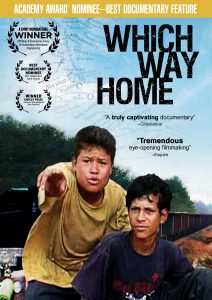I want to use this space to recommend one of my favorite documentaries of all time, which I think it really relevant to some of the themes we’ve explored in this class (particularly, the reality of the Dream, its accessibility, and the quantifications of opportunity). “Which Way Home,” filmed by Rebecca Cammisa and released in 2009, tells the other side of the immigrant story that we heard tonight: the struggles of those trying to get in. Cammisa follows the journey of Honduran, Guatemalan and Nicaraguan child migrants, some as young as eight years-old, as they leave their families behind in pursuit of opportunity in the United States. The kids follow a perilous trail, train-hopping between freight trains collectively known as “The Beast,” which run from southern Central America to the Rio Grande at the U.S.-Mexican border. For many, the journey ends badly, if not tragically. Menaced by predatory smugglers and corrupt police, children (some of whom travel alone) must contend with unpredictable weather, hunger, and the constant dangers associated with their means of travel and the life on the streets they must adapt to. To make things more tragic, some travel thousands of miles in hope of finding opportunity (in the form of well-paying work, adoption, education, a secure life in a thriving American metropolis, connection with missing family members, etc.), only to be intercepted by law enforcement agents at the border and deported back home. Give it a watch when you have the chance; it’s a must-see in my mind.

Trailer: https://www.youtube.com/watch?v=MmLMCuatzV0


